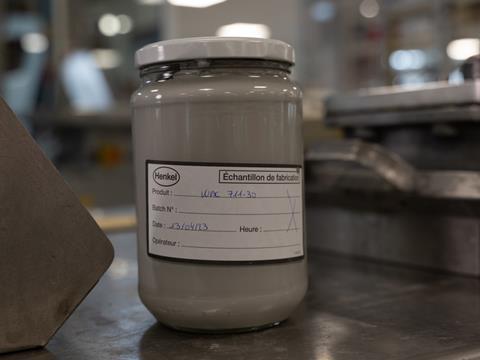
Henkel Adhesive Technologies has revealed DAREX WBC 711, a new sealant for food cans. It is said to lower Greenhouse Gas Protocol emissions by over 30% compared to the existing DAREX OP 2928 compound, excluding the use phase and end-of-life emissions.
The new sealant is designed for irregular ends of tinplate and aluminium cans lined by shower head or die lining application. Often rectangular or oval-shaped, the irregular ends of these cans cannot rely on centrifugal force to distribute sealant around the end perimeter like a round end, making them difficult to seal.
In shower head and die lining application, non-web additives must be added to avoid complications during application, including webbing and cloudy, elongated compound droplets, or ‘angel hair’. This has previously been the case for Henkel’s established DAREX OP 2928, DAREX OP 453, and DAREX OP 53BX compounds.
On the other hand, DAREX WBC 711 is designed to negate the need for additives, thus providing effective sealing without the need to purchase additional additives. Any downtime needed to mix the additive and carry out additional cleaning on the application surfaces has apparently been eliminated.
The cleaner application of the new sealant results in less spoilage and waste, Henkel explains, and it is said to offer an improved pot life with increased storage stability. In turn, less clogging in the applicator nozzles cuts down on metal waste and prevents gaps in the seal, leaks that cause rejection of the can end, and other quality defects.
The water-based sealant is compatible with hot and cold filling, double seaming with or without steam injection, and the following pasteurization or sterilization. Its specific design for traditional shower head and die lining applications makes it compatible with older generation liners.
DAREX WBC 711 is resistant to hot oil and water, Henkel concludes, and as well as offering higher performance at lower cost, it reportedly adheres to both European food legislation and FDA 175.300 requirements.
“The extended pot life and lower carbon footprint are just two of the many ways that the new sealant contributes to more sustainable production of tinplate and aluminum cans,” explains Enzo Orellana, global market strategy manager Sealants at Henkel Adhesive Technologies. “Overall, our customers achieve significantly greater process flexibility which provides environmental, cost and performance benefits.”
The development comes after Henkel announced the relaunch of its bonding and sealing portfolio in cartridges containing up to 95% post-consumer recycled plastic. It is a decision expected to improve the company’s plastics footprint.
In other news, Robatech unveiled its liquid creaser for adhesive application systems, PerfectFold, earlier this year. It is set to enable quick, precise folding in corrugated cardboard applications, improving the assembly process for boxes.
BindEthics has also converted industrial biowaste into a new adhesive, aiming for 90% of engineered wood products to become recyclable in pursuit of a circular economy.
If you liked this article, you might also enjoy:
The L’Oréal approach to packaging sustainability
The way we talk about plastic needs to change – here’s how to get it right
What steps is Apple taking to make its packaging more sustainable?














No comments yet